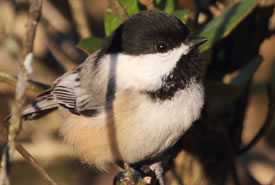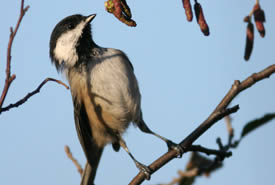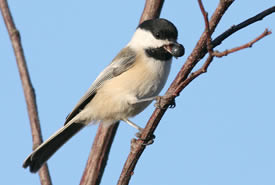Black-capped Chickadee

Black-capped chickadee (Photo by Bill Hubick)
The black-capped chickadee is one of North America's most easily recognized birds.
Chickadees are curious birds. They are quick to discover backyard feeders.
Where does this species live?
Black-capped chickadees will occupy almost any habitat type with trees, including backyards, urban and rural parks and residential areas.
Black-capped chickadees nest in cavities that the female has located. The male and female work together to excavate the cavity to an average depth of about 20 centimetres. Once the nest cavity has been excavated, the female lines the cavity with coarse material, such as moss, followed by softer materials, like fur, to create a cup-shaped nest.

Black-capped chickadee (Photo by Bill Hubick)
What does this species eat?
The diet of the black-capped chickadee varies from summer to winter. In the summer and spring, this bird feeds primarily on insects, spiders and suet. In winter, plant material, seeds and berries make up the majority of their diet.
Black-capped chickadees have great memories. They hide their food in many different locations, remembering thousands of hidden locations to feed from later.

Black-capped chickadee (Photo by Bill Hubick)
What does it sound like?
Black-capped chickadees are social birds that live in large flocks. They communicate through their characteristic call. This call informs fellow flock members of new arrivals and predators.
More "dee-dee-dees" in a call signifies a higher threat level. It is not unusual for other migrants, unfamiliar to the year-round territory of the chickadee, to join up with chickadee flocks and respond to their alarm calls.
Click below to listen to the various calls of the black-capped chickadee (courtesy of Dave Gammon.)
Supported by the Weston Family Foundation.




